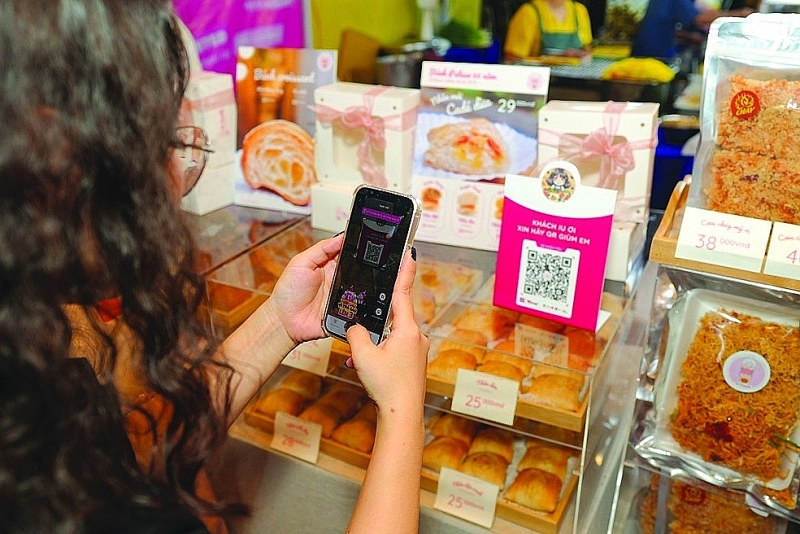Ensuring safety for a cashless society
As the rapid increase in online fraud in the field of non-cash payments, many new solutions are being thoroughly deployed by agencies, units, banks and businesses to ensure user safety and promote the development of non-cash payments.
 |
|
Investing in security technology is one of the important solutions to ensure the safety of non-cash transactions. |
Internet fraud
At the workshop "Improving Security and Safety of Cashless Transactions" held last weekend, Associate Professor, Dr. Tran Hung Son - Banking Technology Development Research Institute, University of Economics and Law, Ho Chi Minh City National University said that Vietnam is in the group of countries suffering the most damage due to digital payment fraud. Specifically, the loss rate due to digital fraud in Vietnam is 3.6 percent of GDP, higher than the global average (1.1 percent) and superior to countries such as Brazil or Thailand (also 3, 2 percent). Meanwhile, many developed countries only recorded very low damage rates, such as Belgium, Ireland (0.1 percent), and the Netherlands (0.2 percent).
According to Major General Nguyen Van Giang, although there have been many drastic measures to prevent and handle crimes using high technology, there are also many difficulties because in the online environment there are many anonymous activities, making tracing difficult; subjects with cross-border activities, taking advantage of loopholes in legal mechanisms and policies. The subjects operate in an organized manner, building many scenarios to commit fraud, assigning specific roles and tasks, and thoroughly taking advantage of science and technology.
Among them, there are five typical fraud tricks that have been recorded: fraud across the telecommunications services; fraud in the financial and banking sectors; fraud via OTT platforms (Zalo, Facebook, Wechat...); calling for financial investment and fraudulently recruiting collaborators for e-commerce platforms such as Shopee, Lazada, and Tiki.
In 2023, A05 verified, traced, and discovered hackers and cyber spies who attacked, stole, and encrypted nearly 700 GB of data, tens of thousands of internal documents, and 62 million personal information and data; coordinated with local police to prosecute 1,500 cases, mainly criminals taking advantage of non-cash payments to commit fraud.
Typically, the agency has destructed more than 20 gangs, seized many devices impersonating mobile broadcasting stations and the subjects who monitored 30 million messages, illegally collecting millions of information and personal data to fraudulently appropriate hundreds of billions of VND. In July 2023, A05 coordinated with Quang Binh Provincial Police to destroy a financial investment fraud line through RosyStyle platform with nearly VND1,800 billion. At the same time, Ho Chi Minh City Police seized a group of 8 people impersonating bank employees who appropriated VND24 billion from 700 victims.
In August 2023, Bac Giang Provincial Police simultaneously attacked and destroyed a group of subjects residing in Hanoi operating under a company model with 37 members, using the trick of impersonating a bank employee consulting on appraising loan applications to appropriate over VND30 billion...
Focus on safety and security
In order to prevent and combat cyber fraud, in recent times, the banking sector has been organizing and implementing many comprehensive and synchronous solutions, including 4 main groups: perfect mechanisms, policies and implementation direction; deploy technological solutions and coordination mechanisms; propaganda and warnings to prevent and combat fraud and crime; coordinate with authorities in preventing and combating online fraud.
In the past five years, the State Bank (SBV) has issued more than 90 written instructions and warnings on ensuring security and information safety for units in the sector. It requires units to synchronously deploy solutions to raise awareness of security and information safety for all bank employees and customers.
In particular, a solution that is actively being deployed is biometric authentication for money transfer transactions of over 10 million VND/time or total transaction value of 20 million VND/day from July 1, according to the Decision. 2345 of the State Bank. Mr. Ngo Tuan Anh, Director of SCS Network Company, said that online fraud cases all have in common that the criminals obtain the victim's personal information and use junk SIM cards. Therefore, facial authentication when transferring money will be an effective solution to help prevent criminals from using "borrowed" accounts to transfer money. Mr. Tuan Anh also recommended that in order to effectively prevent fraud, in addition to transaction authentication solutions, it is necessary to strengthen the management of the owner's SIM card and protect personal information.
Mr. Robert Tran, Deputy General Director of EY Vietnam Cybersecurity Services Company Limited appreciated the State Bank's initiative in introducing strict security standards for banks. Compliance with these standards, although currently requiring effort from some banks, will become mandatory in the future to ensure system safety. Although it currently requires effort from some banks to comply with these standards, it will become a mandatory requirement in the future to ensure system safety.
Regarding banks, according to Ms. Pham Chau Loan, Deputy Head of Digital Channel and Partnership Development Department at Vietcombank, this unit is actively implementing biometric solutions according to Decision 2345 of the State Bank to ensure safety and security in transactions. Customer biometric authentication not only ensures the accuracy and reliability of data but also does not hinder the user's transaction experience.
Mr. Tu Tien Phat, General Director of ACB Bank also said that the face authentication system at ACB has been deployed and received positive feedback from customers. After only 3 days of application, 30,000 customers performed face authentication and this process took less than 30 seconds/customer.
Ms. Dang Tuyet Dung, Director of Visa Vietnam and Laos, said that Visa has invested more than US$10 billion in AI-based solutions to prevent fraud and improve security awareness. Visa is also applying Token technology to encrypt transactions, helping to remove cardholders' private information from the payment flow, enhancing security. Visa is also working with banks and partners to apply data-based authentication instead of OTP codes for e-commerce transactions. This is also a trend in developed markets such as Singapore and Malaysia, helping payment security increase many times.








